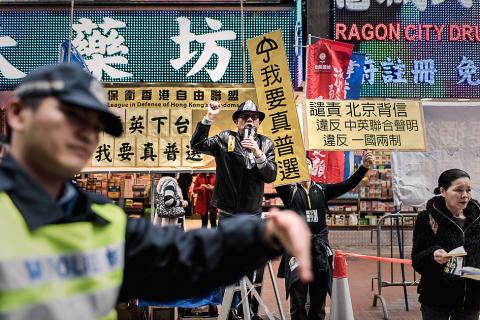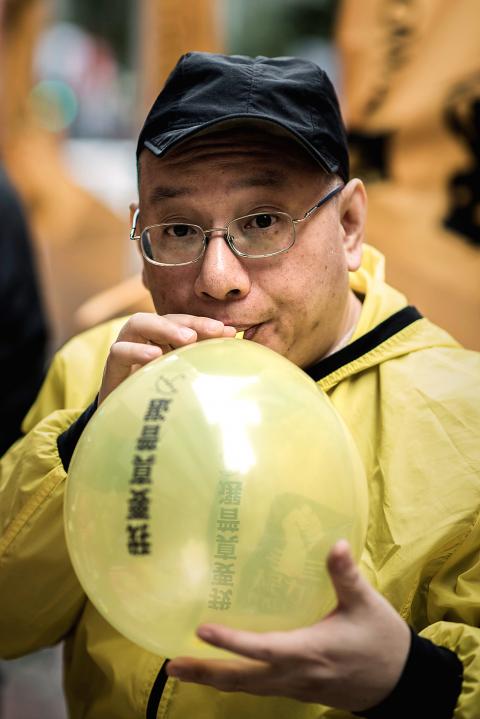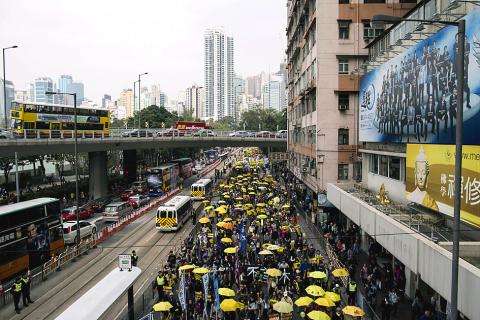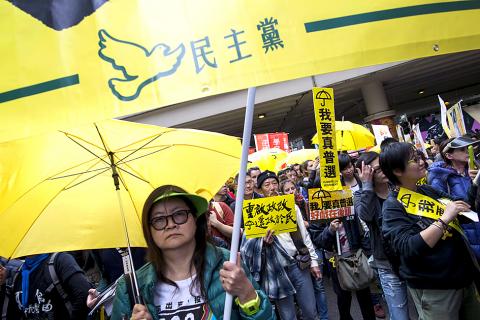Thousands of pro-democracy protesters took to the streets of Hong Kong yesterday for the first time since mass demonstrations shut down parts of the territory for more than two months during the Umbrella movement from Sept. 26 to Dec. 15 last year.
A sea of yellow umbrellas — the symbol of the campaign — moved slowly through central Hong Kong with crowds shouting for “true universal suffrage.”
However, numbers were well below expectations, with 13,000 attending, organizers said — just over one-quarter of the 50,000 they had hoped for.

Photo: AFP
“Today’s protest was not a small one. It was smaller than we expected, but it is wrong to say Hong Kongers have given in to fake democracy,” organizer Daisy Chan (陳倩瑩) said.
Police officials said up to 8,800 people had joined the march, a fraction of the tens of thousands who gathered at the peak of the protests last year.
Authorities have made no concessions to activists’ demands and tensions remain high in the semi-autonomous Chinese territory.

Photo: AFP
Police officials before the rally said that demonstrators were likely to once again try to occupy some of Hong Kong’s main roads, which were cleared of tented camps in December last year.
By late afternoon, the march remained peaceful, with no sign that the crowds — including many people carrying yellow balloons — planned to take back the streets.
“We do not have a plan [to reoccupy]. If others want to do it, they will have to do it themselves,” student leader Alex Chow (周永康) said.

Photo: Reuters
There was a sense of determination among demonstrators.
“We just want to express our frustration with the government in Hong Kong,” protester Ronnie Chan said. “We understand there is very little we can do, but if we do not speak out, nothing will change.”
The pro-democracy rallies drew about 100,000 at their height and saw intermittent clashes with police officers, but public support faded as the weeks passed.

Photo: Reuters
China has promised Hong Kongers the right — for the first time — to vote for their chief executive in the 2017 election.
However, Beijing ruled that nominees must be vetted by a pro-Beijing committee, a proposal heavily criticized by activists.
The movement’s founders, including academic Benny Tai (戴耀廷), along with teenage activist Joshua Wong (黃之鋒) and other student leaders, urged residents to keep fighting as they joined yesterday’s rally.
“If we do not dream, we do not have hope. We should persist, then we will succeed,” Tai said.
Wong warned against accepting universal suffrage within the restrictions of Beijing’s framework.
“I hope people understand that if we take that now, it will be [that way] forever,” he said.
Political analyst Sonny Lo (盧兆興) said that residents were exhausted from protests for reform.
“Members of the public are tired of politics. The democrats have to strategize very carefully,” Hong Kong Institute of Education head of social sciences Lo said.
Hong Kong’s government is urging the public to support Beijing’s electoral plan, which needs the backing of two-thirds of the territory’s legislature to be passed.
Executive Council convener Lam Woon-kwong (林煥光) told protesters to accept Beijing’s offer.
“You cannot threaten the central authorities,” he said on a radio program. “If we can have consensus to have universal suffrage in 2017 first and democratize further later, it would be a more pragmatic approach.”
For some protesters, backing down is not an option.
“I’m just doing my bit. Some people might have compromised, but I definitely will not,” a father of two named Alvin said.

RESPONSE: The transit sends a message that China’s alignment with other countries would not deter the West from defending freedom of navigation, an academic said Canadian frigate the Ville de Quebec and Australian guided-missile destroyer the Brisbane transited the Taiwan Strait yesterday morning, the first time the two nations have conducted a joint freedom of navigation operation. The Canadian and Australian militaries did not immediately respond to requests for comment. The Ministry of National Defense declined to confirm the passage, saying only that Taiwan’s armed forces had deployed surveillance and reconnaissance assets, along with warships and combat aircraft, to safeguard security across the Strait. The two vessels were observed transiting northward along the eastern side of the Taiwan Strait’s median line, with Japan being their most likely destination,

‘NOT ALONE’: A Taiwan Strait war would disrupt global trade routes, and could spark a worldwide crisis, so a powerful US presence is needed as a deterrence, a US senator said US Senator Deb Fischer on Thursday urged her colleagues in the US Congress to deepen Washington’s cooperation with Taiwan and other Indo-Pacific partners to contain the global security threat from China. Fischer and other lawmakers recently returned from an official trip to the Indo-Pacific region, where they toured US military bases in Hawaii and Guam, and visited leaders, including President William Lai (賴清德). The trip underscored the reality that the world is undergoing turmoil, and maintaining a free and open Indo-Pacific region is crucial to the security interests of the US and its partners, she said. Her visit to Taiwan demonstrated ways the

GLOBAL ISSUE: If China annexes Taiwan, ‘it will not stop its expansion there, as it only becomes stronger and has more force to expand further,’ the president said China’s military and diplomatic expansion is not a sole issue for Taiwan, but one that risks world peace, President William Lai (賴清德) said yesterday, adding that Taiwan would stand with the alliance of democratic countries to preserve peace through deterrence. Lai made the remark in an exclusive interview with the Chinese-language Liberty Times (sister paper of the Taipei Times). “China is strategically pushing forward to change the international order,” Lai said, adding that China established the Asia Infrastructure Investment Bank, launched the Belt and Road Initiative, and pushed for yuan internationalization, because it wants to replace the democratic rules-based international

RELEASED: Ko emerged from a courthouse before about 700 supporters, describing his year in custody as a period of ‘suffering’ and vowed to ‘not surrender’ Former Taiwan People’s Party (TPP) chairman Ko Wen-je (柯文哲) was released on NT$70 million (US$2.29 million) bail yesterday, bringing an end to his year-long incommunicado detention as he awaits trial on corruption charges. Under the conditions set by the Taipei District Court on Friday, Ko must remain at a registered address, wear a GPS-enabled ankle monitor and is prohibited from leaving the country. He is also barred from contacting codefendants or witnesses. After Ko’s wife, Peggy Chen (陳佩琪), posted bail, Ko was transported from the Taipei Detention Center to the Taipei District Court at 12:20pm, where he was fitted with the tracking